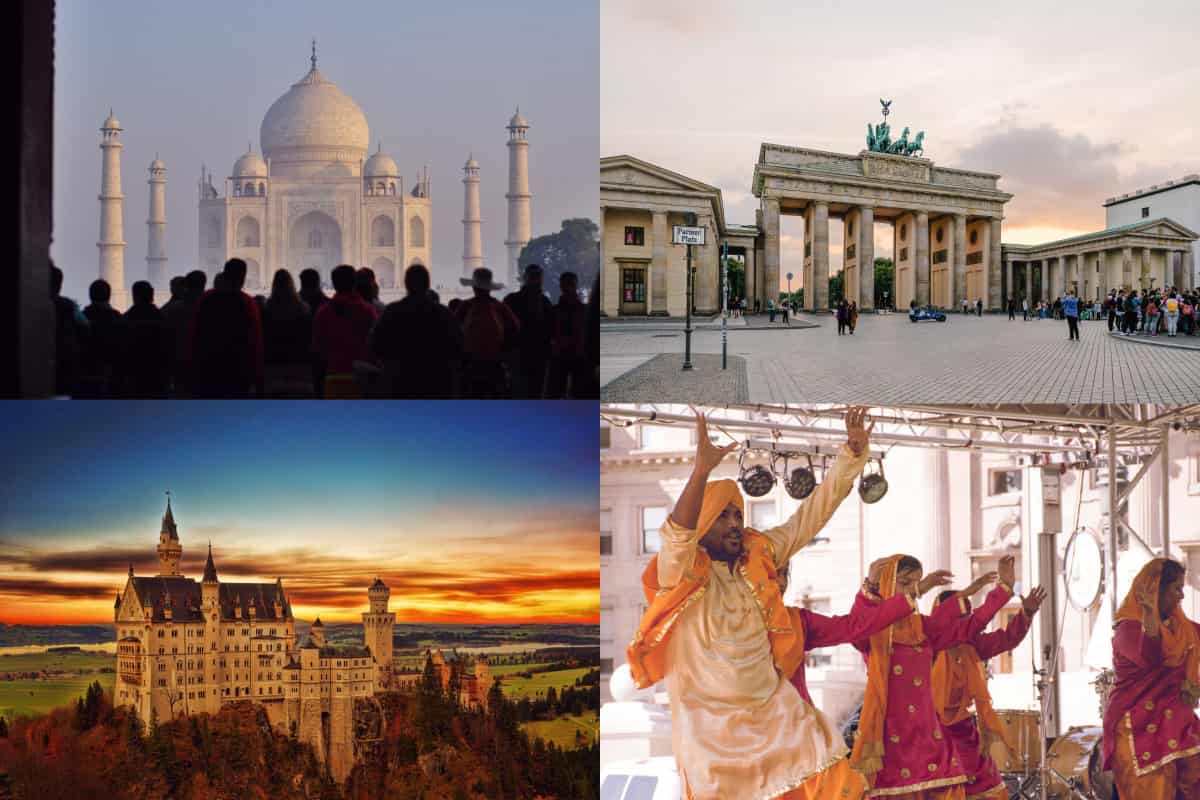So, you’ve got a great education and a few years’ work experience under your belt.
You’re considering emigrating to Europe to either further your career, work for a world class company, get some international experience, or move in search of a better quality of life for you and your family.
Maybe you’ve heard that Germany has many unfilled positions, skills shortages, world-beating companies and a reputation for good work-life balance.
All of this is true.
But have you thought about how you’re going to get hired?
Applying for Jobs in Germany from India: Is it worth it?
If you thought that German companies are desperate to hire Indian candidates, then I’m afraid it’s not the case.
Did you know that in Germany, and indeed in all European Union countries, employers must first give priority to EU citizens when seeking to fill job vacancies?
Did you also know that 95% of job ads are in German, aimed at German speakers?
BUT…
Don’t despair! That doesn’t mean it’s impossible to get hired. Far from it.
However, it does mean that non-EU citizens need to have a unique selling proposition (USP) of why you’re the best candidate for the role.
Being average won’t cut it.
So, what’s your USP?
Perhaps it’s because you studied at a world class university in the US, Canada or Australia.
Or perhaps it’s because you were in the top 10% of graduates from your academic institution. Or you hold a PhD in a field which is very specialised and in high demand (for example, cybersecurity).
Or maybe your experience is in a profession where there are recognised worker shortages. These are predominantly skilled technical trades and STEM based occupations.
The Federal Agency for Employment used to publish a list of these, but they no longer do so since the March 2020 changes to the immigration law.
Without any of these, you’re just another job seeker who needs a visa and likely doesn’t speak the language. So, if you’re looking where everyone else is looking, and for a position where there aren’t really any worker shortages, then you’re going to struggle.
If this is a harsh reality check then I’m afraid I’m just telling it like it is. I’m potentially saving you a lot of time and money to ensure you’re prepared and ready to tackle this with the right mindset and expectations.
Where to look for jobs
Where you should you look for jobs to improve your chances of getting hired?
Well, first of all, you shouldn’t ONLY be looking where everyone else is i.e. on the most popular job sites.
I call this the “hottest girl in high school” principle. Everyone chased after the most popular girl at school, but very few of us were actually successful in dating her (as a weedy teenager and one of the shortest guys in my school year, I certainly wasn’t. Just for the record!)
The same applies for job applications.
If you’re applying to huge corporations that have a reputation for hiring in English, then guess what?
Everyone else is looking there too.
That invariably will mean suitably qualified EU citizens are also applying. Because they don’t need a work permit, they’re clearly going to be more attractive to employers.
So, first things first.
If you don’t yet have a strategy, you need one.
As a bare minimum, you should confidently be able to answer these questions before you embark on your job search…
1) Why should they hire you over other candidates?
2) What are you going to do to differentiate yourself from what everybody else is doing in their job search?
3) Where are you going to look for jobs to help get one step ahead of the competition?
4) How are you going to answer if they want to interview you face-to-face?
When does applying for jobs in Germany from India make sense?
It’s obviously much easier to attend interviews when you’re actually in the country .
If you’re applying from the other side of the world, this isn’t possible. As Indian citizens, sadly, you need a visa to enter the country. This obviously makes things a bit more tricky.
But even if you didn’t have this hassle, would you be prepared to spend over a thousand dollars just to attend one interview?
Logic would suggest that applying for jobs in Germany from India only makes sense in 2 scenarios:
1. Those industries where face-to-face interviews are not seen as an absolute must-have i.e. startups and the tech sector – predominantly
2. If you already have applied for (or have already secured) a Job Seeker Visa which will enable you to travel to Germany to look for work and attend any interviews.
Let’s deal with the first scenario.
Most industries in Germany will want to meet with you face-to-face and have a physical meeting with you.
The first interview may well be a Skype or Zoom video conference, led by the HR department. Usually when they have shortlisted candidates, there will be second interview and in most cases this will be with the hiring manager.
When is it less possible?
Pretty much every other industry outside of the tech sector will likely want to meet with you. So, how are you going to commit to an interview if the process of getting a visa takes several weeks, and even after securing your visa, you still need to book a flight?
It’s a rhetorical question because you know you can’t.
Perhaps you’re lucky and possess a skill or a specialism that makes you wildly employable. If you do, then great. A potential employer may be willing to wait, while you go through the visa process to travel to Germany for an interview.
But for the 99% of you who don’t belong in this segment, you need to physically be in Germany to have a realistic chance of securing a job offer.
As an Indian citizen, the easiest and most effective way to do this is through a Job Seeker Visa.
Job Seeker Visa
The Job Seeker Visa enables you to legally enter Germany and live in the country for 6 months for the sole purpose of seeking work.
It doesn’t entitle you to work, or claim social benefits, and it certainly doesn’t allow for any family reunification.
It’s simply a mechanism designed to allow job seekers from non-EU countries the opportunity to spend a longer time in the country to increase their chances of successfully attending interviews and receiving job offers.
With a formal job offer that meets the requirements for a residence permit, the candidate may then apply for either an EU Blue Card or a standard residence permit (which one will depend on the salary, job role and the candidate’s educational background).
Once you’ve received your residence permit, you are then entitled to bring your family with you and commence your employment.
Job Seekers - Boost your chances of success!

Looking for a job in Germany?
You need to have a stellar CV, cover letter and optimised LinkedIn profile.
Your international format CV won't cut it. Cover letters in Germany are also an art.
Our templates and my coaching for job seekers like you will help you to get more interviews!
What you CAN do beforehand
While it’s difficult in most cases to secure a job offer in Germany directly from India without travelling to interviews, there are a number of employment tips and strategies you can use.
LinkedIn outreach
Did you know that LinkedIn is searchable by keywords, similar to the way Google search is? The function is not as advanced (Google is a search engine, whereas LinkedIn is a business networking platform) but it works.
Try typing phrases such as “Pharmaceutical jobs + Frankfurt” or “mechanical engineer + Munich” into the search box and you will soon discover who the headhunters and recruitment companies are in your industry.
Reach out to them in a non-spammy way.
Personalise the message in your connection request. And please, for heaven’s sake, use proper punctuation. Nothing is more annoying than reading a message in text speak with no punctuation. You went to university and got a degree, so make sure that your messages reflect that!
LinkedIn allows you to send a message with each connection request. I can say from personal experience (I use LinkedIn a LOT in my other business) that I only accept connection requests from complete strangers if they add a message.
Not including a thoughtful message = I suspect they’re going to immediately spam me with something like “hello sir please i need job”.
9 times out of 10 I decline the request.
Nurture and grow your LinkedIn network. Look at your connections and who they have in their network, to see if any of them could help open some doors for you.
Optimise your LinkedIn profile and Germanise your CV
Doing this is a no-brainer. This is the most basic of basic requirements. But surprisingly, around 80% of the people I coach:
1. Have not put much effort into their LinkedIn profile and;
2. Don’t have their CVs in the German-style format.
Would you go to the batting crease for your innings without any knee protectors?
Your CV doesn’t actually need be in German language (if you’re applying for English jobs) but DEFINITELY needs to be in the recognised format used in Germany.
This is NOT the same as the format used in the US & Canada, Australia, the UK, or the UAE.
Not doing this is a sure fire way for your application to immediately land in the trash.
Write a killer cover letter
The cover letter should not be something that essentially just says “here’s my CV, please give me a job”. This is the place to showcase your soft skills and some of your achievements outside of just formal professional experience.
This should be one page, and formatted to print on A4 paper.
If you’re using US settings in Microsoft Word or Google Docs and it’s set up as US Letter page format, then make sure to change this setting. It’s not going to make a great first impression if a recruiter tries to print it and the formatting is a mess.
You’ll also need to research what salary to ask for, as this is typically not revealed in the job posting and is considered as a point of negotiation.
Reach out to fellow alumni, or contacts who may work for German companies
Your network is your net worth.
Someone you went to college with, or in your extended professional network probably works for a German company or deals with German customers or suppliers.
Reach out to them and ask them for advice or potential introductions.
Hardly anyone seeking a job in Germany will actually do this, so you’re getting one very valuable step ahead of the competition.
Now it’s time for ACTION
Only once you have a clear strategy and have done some solid preparation does it make sense to seriously consider applying for a Job Seeker Visa.
The process is costly, both in time and financially. Consider the time for your application and attending an interview at the Embassy or Consulate, as well as any translations and notarisations of your qualifications. Then add on top the funds you’ll need for 6 months living in a high cost country while you’re attending interviews and seeking work.
Without solid preparation and a savvy strategy behind you, you’re very likely going to be wasting several thousand Euro. Don’t throw your hard earned money away, or walk away from a good career in India, without a solid chance of success.
Be prepared, and seek out professional advice and coaching. You probably think that spending a few hundred euro on this is a lot of money.
Look at it this way. Just imagine if you ultimately wasted several thousands on visas and accommodation because you failed to find a job through lack of preparation and strategy.
Invest time in growing your network, think outside of the box and you will reap the rewards.
Now you know WHAT steps you need to take, it’s time to take action on your road to success.
I wish you good luck and every success on your journey!











